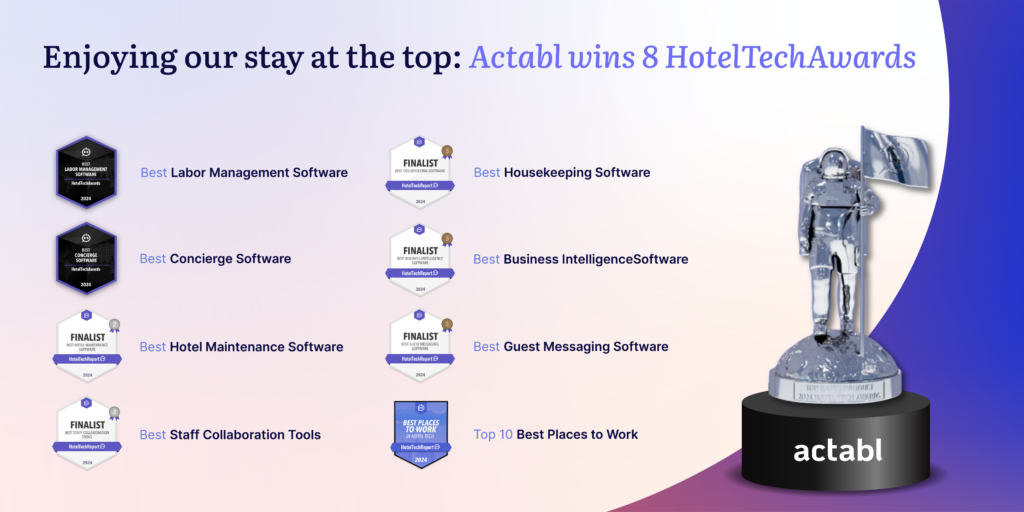
8 guaranteed ways to reduce your hotel’s largest operating costs
Rising labor costs, utilities, and maintenance expenses are a few of the largest operating costs in a hotel that greatly impact your bottom line. If you’re not taking a proactive approach to controlling these expenses, your hotel will not generate the amount of profit that it should.
Here are a few ways you can reduce your hotel’s largest operating costs and increase your profitability:
Labor Costs (accounts for almost half of operating costs):
1. Make sure your schedules reflect the day-to-day variations in business volume.
You never want to create fixed schedules for hourly employees. Oftentimes, a hotel will either be overstaffed or understaffed when using a fixed schedule – and overstaffing wastes profits. Instead, use the forecast to schedule to the labor standards you’ve created for each position in your hotel, and then update the schedule accordingly if adjustments need to be made.
2. Never set one MPR (minutes per room) standard for all room types.
Have clear standards for how long it should take housekeepers to clean every room type in your hotel. Even further, a clear MPR standard should be set based on clean types (for example, stayover rooms, which might require a light clean, vs. checkout rooms, which would require a full clean).
From there, you’ll be able to monitor how long each housekeeper spends on cleaning each room and compare it to your standards. This will enable you to spot out any inefficiencies and address them immediately to avoid overspending on housekeeping labor. (Click here to see how this method reduced one hotel’s housekeeping costs by 7.4%)
3. Cross-train your staff.
You should always equip your staff with the necessary skills to perform tasks outside of their day-to-day job functions. This way, they will be able to lend a hand to other departments during any downtime they may have.
4. Implement a labor management system.
Labor management systems are a suite of tools designed to help hotels control their labor costs. Small hotels with 25 employees typically save over $40,000/yr. with Hotel Effectiveness’ labor management system. Larger hotels with 100 or more employees save over $150,000/yr.
Utilities (accounts for approximately 6% of operating costs):
5. Consider swapping out old thermometers for new ones with occupancy sensors.
According to the California Statewide Utility Codes and Standards Program, occupancy controls in hotel rooms are estimated to save between 12 and 24% in heating and cooling energy, based on a 5-degree setback when the room is vacant. The same concept applies to lighting, as well. And speaking of lighting…
6. Switch to LED lighting.
LED lighting is one of today’s most energy-efficient and rapidly-developing lighting technologies. Energy.gov states LED bulbs use at least 75% less energy and last 25 times longer than incandescent bulbs.
7. Encourage guests to reuse their towels.
Placing small signs or placards in the guestroom encouraging guests to reuse their towels can go a long way. The American Hotel and Lodging Association estimates that the request reduces the number of loads of laundry washed—as well as the related water, sewer, energy, and labor costs—by 17 percent. The association also notes that this initiative increases the lifespan of towels and linens, thus reducing replacement costs. Hoteliers generally save up to $6.50 a day per occupied room with such programs (source: Association for Linen Management).
If you’ve already implemented a towel reuse program but are not noticing much participation, consider your messaging. Research shows that guests would more often comply with signs that promoted descriptive norms rather than one that simply encourages guests to help save the environment. Consider a variation of the following message:
“Join your fellow guests in helping to save the environment! Almost 75% of our guests participate in our resource savings initiative by using their towels more than once. You can join your fellow guests to help save the environment by reusing your towels during your stay.”
Property Operation and Maintenance (accounts for approximately 4-6% of operating costs):
8. Stay on top of preventative maintenance.
Did you know that an air filter that has not been replaced in over 4 months can reduce HVAC efficiency by 10%? Pushing off preventative maintenance can cost you in the long run. Make sure your engineers are keeping up with scheduled maintenance tasks.
Implementing any one of these simple tactics will surely reduce your operating expenses by some degree. Where you’ll notice the real savings is when you apply a few or all of them – it all adds up.







